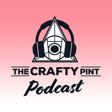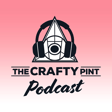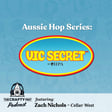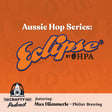
Seven Sheds & Countless Stories
“I think Seven Sheds was a bit like the Velvet Underground. It’s been said about the Velvet Underground that they didn’t sell many records, but every second person who bought a record went off and started their own band. And I think we were a bit influential… to our own detriment.”
Less than a year on from the first episode of The Crafty Pint Podcast, we’ve reached our 50th show, and mark the occasion with suitably distinguished guests.
While many who first discovered craft beer in recent years may never have encountered Seven Sheds, or indeed co-founder and head brewer Willie Simpson, those who have enjoyed their beers or read Willie’s words will be well aware of the vital role he played in bringing beer – and respect for it – to a wider audience.
A few weeks ago, Willie and partner Catherine Stark bade farewell to cellar door customers for the last time, bringing to a close 17 years of brewing and pouring at their home in Railton, all while helping build the region’s tourism infrastructure.
They joined us for a broad-ranging chat that covers Willie’s homebrewing days in Sydney and lengthy career as a freelance drinks writer, their decision to open a tiny residential brewery, meadery, hop garden and cellar door in Railton, the bureaucracy crushing small businesses, brewing beers with home-smoked peat bought from a guy called Pete, the beauty of open fermenters, the toilet tax and more.
The start of the episode sees Will and James discussing the week’s news, although once again doing so a few hours before we could confirm Rocky Ridge were the buyers of Fox Friday’s Perth outpost.
In non-Mountain Culture-related news, there was our Brew & A with Tim Howard – the head brewer at double AIBA trophy-winners Merino Brewery, a feature on the man behind the beers at Bicheno Brewing on the Tasmanian East Coast, and a heads-up for three upcoming Crafty Pint events at BentSpoke, KAIJU! and Slipstream, each with discounts for our beer club members.
We reveal the identity of the latest “good beer citizen” in our Have You Done A Rallings? campaign and, given we’ve racked up 50 episodes, we’re also keen for feedback from listeners / viewers and have launched a survey so you can tell us what you think of the show.
Start of segments:
- 10:41 – Willie & Catherine Part 1
- 36:19 – Have You Done A Rallings?
- 38:32 – Willie & Catherine Part 2
To find out more about featuring on The Crafty Pint Podcast or otherwise partnering with The Crafty Pint, contact craig@craftypint.com.



